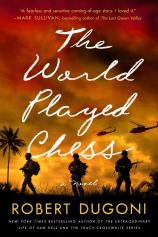The World Played Chess
Review
The World Played Chess
Whether you enjoy his Tracy Crosswhite police procedural series or you fell in love with THE EXTRAORDINARY LIFE OF SAM HELL, there’s no doubt you’re already a fan of Robert Dugoni’s work --- or you will be very soon. In THE WORLD PLAYED CHESS, he explores the lives of a Vietnam veteran struggling with PTSD and a man over a decade younger who just missed the call to action. Alternating perspectives and timelines, Dugoni paints an epic portrait of a world stripped of innocence and the shaping of these two men's destinies.
When we meet Vincent Bianco, the year is 2015 and he is a successful lawyer, happily married and the father of two children. His son, Beau, is a sports-obsessed high school senior, and Vincent often catches himself recalling his own final year of teenagerdom. But when a mysterious package arrives, Vincent reflects on his friendship with William Goodman, who he met while working on a construction site during the summer before college. Though only about a decade older than Vincent, William was wisened and aged by his time in Vietnam as a marine and photographer. Now he has entrusted Vincent with his journal from that battle-worn, traumatic time. His only request is that Vincent read the entire book in order, so that he can fully understand the way that Vietnam changed him --- and hopefully learn from it.
Alternating between William’s teenage journal entries, Vincent’s own last summer as a teen, and present-day Vincent watching his son become a man, Dugoni explores three people on the precipice of tremendous growth and change. Through young William, living in 1967, we see the early days of life as a marine: the brutal training in Parris Island, South Carolina, the first glimpses of Vietnam in Da Nang, and, of course, the brutalities and violence witnessed by too many young men.
"Expertly weaving together three coming-of-age stories set in three dramatically different time periods, THE WORLD PLAYED CHESS is a masterwork of emotion from an author who seems like he hasn’t met a genre he can’t conquer."
A proud New Jersey boy, William has his eyes on the future, and with his high test scores, he hopes to leave Vietnam with not only his life but a resume that will help him secure a career as a journalist. When he is instead given a rifle, a pack of cigarettes and a camera, he starts to realize how deeply the war will affect him and how limited his perceptions of war have been so far. He quickly learns that “growing old is a privilege, not a right” when his bunkmate is killed on the very first night of open fire. His journal entries provide the backbone of the book, with his story driving most of the action and providing some of the most emotionally intense scenes.
Only 12 years later, in 1979, the William we meet has changed. Though he is only 30, he already has a dusting of white hair, and where he was once mostly sober, he is now known as a pothead by his fellow construction workers. When teenage Vincent begins working with William, introduced by his sister’s boyfriend, Mike, he is drawn to the veteran’s stoic, ponderous nature, and often stays late to drink beers and talk with the man. Already the differences in their lives are clear: Vincent points out that his generation is the first in the century to be able to plan for the future without a war hanging over their heads.
One of nine children, Vincent worries about finances and affording college, as well as losing his high school friends, but his concerns never stretch to murderous foes or nights spent squatting over a log in the jungle. Still, Vincent knows that he, too, is right in the middle of his own coming-of-age story, and that life will never again be quite as effortless or carefree. Already intelligent and the valedictorian of his class, he is further educated by William’s stories about life in Vietnam --- from the jokes about men who tease one another about their masculinity and sexuality to his accounts of venomous snakes and gun-toting enemies.
Of course, the changes in the world and in the freedom of America’s youth are never more clear than in the chapters written through an adult Vincent’s eyes in 2016. Watching Beau play football and party with his friends, he is never more aware of the value of his child’s life or the privileges that come with choice: the choice of what to do after high school, what to study and how to live. Although Vincent's present-day life makes up the third plot line, it is the storylines of young Vincent and young William that make up the meat of THE WORLD PLAYED CHESS, though their juxtaposition with Beau, especially as seen through his father’s eyes, makes for many interesting comparisons. Because Vincent is unpacking the stories of William’s life, reflecting on his own and watching his son’s, his plot line is the most complete and offers a lot of potential for discussions on fate, luck and destiny. Dugoni weaves three compelling, relatable coming-of-age stories, each of which are poignant, gripping and full of redemption.
As always, Dugoni excels at immersing his readers not only in his settings, but in his characters’ viewpoints and experiences. Never before has Vietnam come alive for me so thoroughly: the camaraderie of the men (even against their own wishes; it is harder to leave friends behind than it is to part with fellow soldiers who are essentially strangers), the smells, the brutal training and, of course, the double-edged sword of hoping to come home alive and not wanting to be responsible for another young man, even on the other side, not doing the same.
While William is uncomfortable with killing, the book does not shy away from showing us his fellow marines who delight in it, often to the eye-rolling discomfort of his peers. Dugoni has a real knack for unpacking the emotions and pivotal moments in some of our country’s most dangerous positions. Like he has with his Tracy Crosswhite and Charles Jenkins series, he makes the battlegrounds of Vietnam, previously an insular, practically unknowable world, feel immediate and vivid for his readers, especially those of us born long after the war.
Dugoni makes an interesting choice in allowing us to see William at 30 and, through his mysterious package to Vincent, 67. In many authors’ hands, these revelations would lessen the blow of the more dramatic scenes in Vietnam, as we already know that William survives. But Dugoni is a master of the slow reveal, and as a 30-year-old William starts to show signs of PTSD and a 67-year-old William makes one last desperate attempt to share his story, it becomes clear that while he may have survived, he is not without his scars, both physical and emotional.
Expertly weaving together three coming-of-age stories set in three dramatically different time periods, THE WORLD PLAYED CHESS is a masterwork of emotion from an author who seems like he hasn’t met a genre he can’t conquer. Rich with historical detail and as poignant and powerful as the best works of fiction, this novel is a gut-punch of a story that is as fearless as it is insightful. Don’t miss the author’s note or the acknowledgments in this one; Dugoni’s explanations for his research process and inspiration are nearly as compelling as the book. And if you haven’t read him yet, what are you waiting for?
Reviewed by Rebecca Munro on September 17, 2021
The World Played Chess
- Publication Date: September 14, 2021
- Genres: Fiction
- Hardcover: 400 pages
- Publisher: Lake Union Publishing
- ISBN-10: 1542029376
- ISBN-13: 9781542029377




